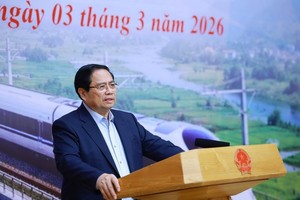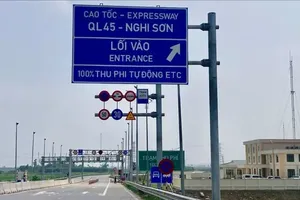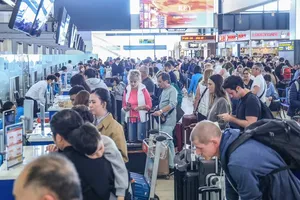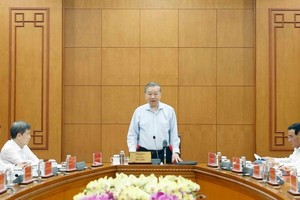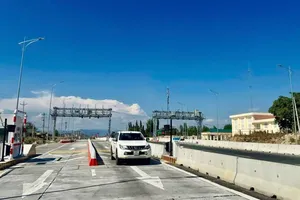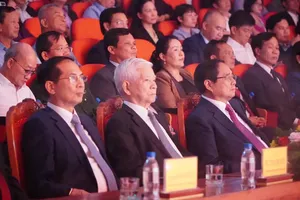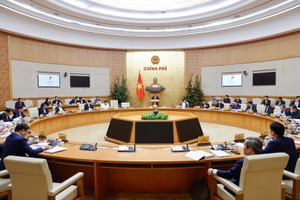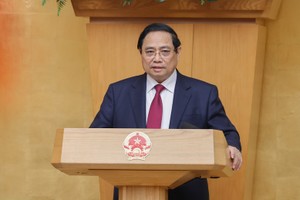The consumer price index (CPI) for the first two months of this year has increased at a manageable rate thanks to the Government’s price stabilization strategies such as ensuring stocks of commodities for consumption and market monitoring, said Minister of Finance Vu Van Ninh.
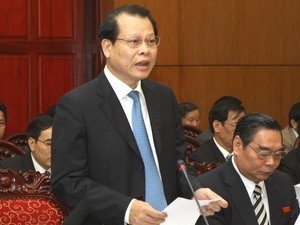
In a report on the ministry’s performance in price management at the 29th meeting of the National Assembly’s Standing Committee on March 19, Minister of Finance Vu Van Ninh said the latest 6.8 percent electricity price rise would only push the CPI up by 0.16 percent.
He said the rise was reasonable because it would only increase production costs by 0.09-2.28 percent for some production sectors that use a lot of power.
“There will be no more increases in the price of electricity this year or next year,” he added.
Minister Ninh said the raise in the price of coal only applied to coal sold to power producers so it affected only the price of power with no direct impact on prices of other commodities.
When asked about the state petrol companies’ right to adjust petrol prices, he said the ministry had asked petrol companies to reduce local prices right after drops in global petrol prices.
In addition, he said, the ministry had asked them to widen the period between consecutive adjustments to at least 20 days, rather than 10 days as regulated.
The Minister said at present, there was no reason to worry about the petrol companies’ exclusive rights to sell petrol and decide prices.
Regarding macro financial targets, he said all were in safe thresholds and the ministry has sought ways to exploit other funds.
Continue to save Jestar Pacific Airlines
The Ministry’s responsibility for State asset management was highlighted at the meeting by problems currently being faced by Jetstar Pacific Airlines (JPA).
Explaining the ministry’s pumping of extra funds into the airline to maintain its operation, Minister Ninh said, “The airline would have gone bankrupt but we have saved it. Now, JPA needs time to recover.”
Unsatisfied with the explanation, Deputy Nguyen Van Tuyet from the northern mountainous province of Yen Bai and Security and Defense Committee Chairman Le Quang Binh asked why the Government didn’t let JPA go bankrupt, instead of letting it continue to lose money for many years.
Mr. Ninh said that Pacific Airlines, a subsidiary of Vietnam Airlines, was established in 1991 and ran at a loss until 2005. It would have been dissolved, but through negotiations with Australia’s Qantas, the Government realized that it still had value and capacity to develop.
Thus the Government decided to restructure the airline.
Qantas assessed the value of the airline and bought a 30 percent stake to set up the low-cost Jetstar Pacific Airlines.
Since then, JPA has faced many difficulties, which it tried to overcome, but because of its recent petrol price hedging, the airline has not made a profit, he added
The minister said if the airline could recoup its losses and was given more equipment and facilities, it would develop.
Construction safety

At the meeting, Minister of Construction Nguyen Hong Quan told National Assembly deputies about its responsibilities and performance in ensuring labor safety in construction, building houses for poor and low-income people, maintaining safety and order in new urban areas and apartment buildings, and construction planning.
Deputy Ma Dien Cu of Quang Ngai Province said labor accidents in the construction sector made up nearly 50 percent of total labor accidents.
Mr. Cu asked: What were the main cause of the accidents and what were the solutions?
Minister Quan said investors and contractors failed to ensure safety for their employees on construction sites, while the employees themselves did not have adequate knowledge or skills to protect themselves.
He said the ministry issued more than 1,250 labor regulations related to construction sites as well as technical and architectural conditions to ensure safety for workers.
However, the regulations still hadn’t caught up with modern technologies and complex projects, he said.
Mr. Quan pledged that legal documents and regulations would be continually updated to deal with changes in technology and project types.
Tighter regulations needed
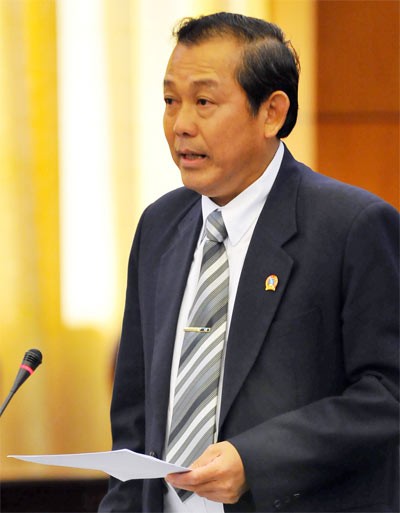
At the same meeting, Supreme People’s Court chief judge Truong Hoa Binh said the number of disputes over land had recently increased sharply and was becoming more complicated.
To move cases along quicker, he said there should be tighter regulations to impose sanctions on agencies, organizations and individuals who are not willing to cooperate with the court to provide evidence and documents related to matters in dispute.
He asked the National Assembly to amend the Land Law and the Law on Civil Procedure to make them more consistent with the Law on Complaint and Denunciation.

